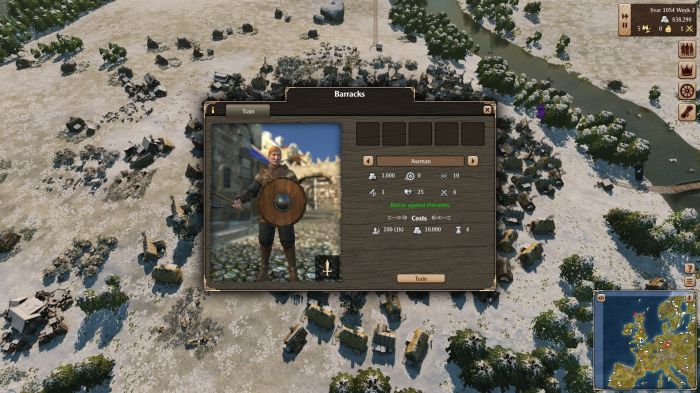
Have you ever dreamt of building a mighty empire, expanding your dominion across vast lands, and leaving your mark on history? Empire-building games offer a captivating escape into a world of strategic conquest, resource management, and political intrigue. From the ancient civilizations of Rome to the sprawling interstellar empires of the future, these games allow you to forge your own destiny, shaping the fate of your virtual realm.
These games appeal to a wide range of players, drawing inspiration from historical events, fantasy realms, and even science fiction. Whether you prefer meticulously managing your economy, engaging in cunning diplomacy, or waging epic battles, empire-building games offer a diverse and engaging experience. This genre has evolved over the years, incorporating complex mechanics and immersive storylines, making it a popular choice for both casual and hardcore gamers.
Key Elements of Empire-Building Games

Empire-building games offer players a chance to shape their own civilizations, from humble beginnings to sprawling empires. The genre is characterized by a unique blend of strategy, resource management, and social interactions, all intertwined to create a compelling and immersive gameplay experience.
At the heart of these games lies a set of core mechanics that define the genre and determine the paths players can take towards building their empires. These mechanics, when skillfully utilized, allow players to navigate the complexities of resource allocation, diplomacy, warfare, and technological advancements, ultimately shaping the destiny of their civilizations.
Resource Management
Resource management is the backbone of any empire-building game. Players must carefully manage their resources, which typically include food, wood, stone, gold, and other essential commodities. These resources are crucial for various aspects of empire development, including building structures, training troops, researching technologies, and expanding territories.
The importance of resource management cannot be overstated. It directly impacts the growth and prosperity of the player’s empire. Efficient resource allocation can lead to rapid development and a strong military, while mismanagement can lead to stagnation, vulnerability, and even collapse. Players must strike a delicate balance between utilizing resources for immediate needs and investing in long-term growth.
For instance, in games like “Civilization VI,” players must carefully manage their cities’ production capabilities, ensuring they produce the necessary resources for growth while also generating surplus for expansion or research. Similarly, in “Age of Empires II,” players must prioritize gathering resources to construct buildings, train units, and advance through different technological ages.
Diplomacy
Diplomacy plays a crucial role in shaping the dynamics between empires. Players can engage in alliances, trade agreements, or even declare war. The success of diplomacy depends on various factors, including the player’s reputation, military strength, and strategic alliances.
The ability to negotiate favorable treaties, forge strategic partnerships, and maintain peaceful relations can be as important as military prowess. Diplomacy allows players to gain access to valuable resources, secure borders, and form powerful alliances against common enemies.
For example, in “Europa Universalis IV,” players can engage in complex diplomatic negotiations, forming alliances, declaring war, and maneuvering for political influence on the global stage. The success of these negotiations can significantly impact the player’s ability to expand their empire and achieve their goals.
Warfare
Warfare is an integral part of many empire-building games, allowing players to expand their territories, conquer rivals, and establish dominance. The effectiveness of military strategies depends on various factors, including unit composition, technology, terrain, and tactical decisions.
Players must carefully consider their military options, balancing offensive and defensive strategies to achieve their objectives. A strong military can provide security, allow for territorial expansion, and secure valuable resources. However, engaging in warfare can be costly, requiring significant resource investment and careful planning.
In games like “Total War: Warhammer,” players can engage in large-scale battles, deploying various units with unique strengths and weaknesses. The outcome of these battles can determine the fate of empires, with victory leading to expansion and defeat leading to territorial losses.
Technology
Technological advancements are crucial for driving progress and shaping the future of empires. Researching new technologies allows players to unlock new units, buildings, resources, and strategies. The pace of technological development can significantly impact the player’s ability to compete and thrive in the game.
The development of technologies can revolutionize the way empires function. For instance, in “Civilization VI,” players can research technologies that enable them to build more advanced units, explore new continents, and harness new resources. Similarly, in “Age of Empires II,” researching new technologies allows players to unlock powerful units, improved defenses, and new economic options, giving them a competitive edge.
Strategic Approaches to Empire Building

In the realm of empire-building games, victory often hinges on the strategic approach employed. Players must navigate the intricate web of conquest, diplomacy, and economic development, choosing the path that best suits their goals and the game’s unique challenges. This section delves into various strategies for expanding empires, emphasizing the importance of adaptability and providing examples of successful strategies from popular games.
Conquest Strategies
Conquest, the most direct approach to empire building, involves military expansion through force. This strategy requires a strong military, a well-defined plan of attack, and the ability to manage the conquered territories effectively.
- Blitzkrieg: This strategy emphasizes rapid, overwhelming attacks to quickly conquer territories before the enemy can mount a proper defense. The key is to strike swiftly, exploiting weaknesses and achieving decisive victories before the opponent can recover. This approach is often seen in games like Civilization, where players can leverage early military advantages to rapidly expand their empires.
- Siege Warfare: This strategy focuses on slowly chipping away at enemy defenses through prolonged sieges. Players invest in powerful siege engines and utilize tactics like undermining walls or starving out garrisons to overcome fortified cities. Age of Empires and Total War series are known for their detailed siege mechanics, allowing players to master this strategy.
- Guerilla Warfare: This strategy emphasizes hit-and-run tactics, utilizing smaller, mobile units to harass enemy forces and disrupt their supply lines. Guerilla warfare is particularly effective against larger empires with sprawling territories, as it allows for a more adaptable and less resource-intensive approach. Games like Mount & Blade and StarCraft offer opportunities to employ this strategy.
Trade Strategies
Trade offers an alternative path to empire building, focusing on economic growth and diplomacy rather than military might. This strategy involves establishing trade routes, developing industries, and forging alliances with other nations.
- Merchant Republics: This strategy emphasizes the development of trade networks and the creation of wealthy merchant classes. Players focus on building trade routes, establishing colonies, and amassing wealth through trade. Examples include the Medieval II: Total War campaign featuring Venice, and the Civilization series’ focus on economic development.
- Diplomatic Alliances: This strategy emphasizes forging strong alliances with other nations through diplomacy and trade. Players use these alliances to secure resources, protect themselves from aggression, and expand their influence. Europa Universalis and Crusader Kings series offer in-depth diplomacy systems that allow players to cultivate these relationships.
- Economic Domination: This strategy focuses on maximizing economic production and controlling key resources. Players invest heavily in infrastructure, technology, and resource extraction to gain a significant economic advantage over their rivals. This strategy is often seen in Civilization and Age of Empires where players can achieve dominance through economic prowess.
Alliance Strategies
Alliances are crucial for empire building, offering protection, access to resources, and a platform for joint expansion. This strategy involves carefully choosing allies, managing relationships, and coordinating efforts for mutual benefit.
- Defensive Alliances: This strategy focuses on forming alliances with neighboring nations to deter aggression. Players pool their resources and military might to create a formidable deterrent against potential enemies. Europa Universalis and Crusader Kings feature intricate alliance systems where players can secure their borders and gain strategic advantages through diplomatic alliances.
- Offensive Alliances: This strategy involves forming alliances with other nations to conquer territory together. Players coordinate their military forces and share resources to achieve ambitious goals. Examples can be found in games like Civilization and Age of Empires, where players can form powerful alliances to dominate the map.
- Coalitions: This strategy involves forming a group of nations to counter a powerful enemy. Players combine their resources and military might to defeat a common threat and maintain a balance of power. Crusader Kings and Europa Universalis offer opportunities to create powerful coalitions to challenge dominant empires.
Top Games for Empire Building
Building an empire in a video game offers a unique blend of strategy, resource management, and diplomacy. Whether you prefer conquering vast territories or carefully cultivating your nation’s prosperity, these games provide immersive experiences that challenge your decision-making skills and allow you to shape the fate of your virtual civilization.
Popular Empire-Building Games
These games offer a diverse range of experiences, from grand-scale strategy to focused city-building, catering to various preferences and playstyles.
- Civilization VI (PC, Mac, Linux, iOS, Android): This turn-based strategy game focuses on the rise and fall of civilizations throughout history. Players research technologies, expand their empires, and engage in diplomacy and warfare. Civilization VI excels in its depth, offering numerous historical scenarios, customizable gameplay options, and a rich array of civilizations to choose from.
- Europa Universalis IV (PC, Mac, Linux): This grand strategy game provides a detailed and immersive experience, spanning centuries of global history. Players manage their nations, engaging in diplomacy, warfare, trade, and technological development. Europa Universalis IV is renowned for its intricate mechanics, historical accuracy, and the freedom it grants players in shaping their empires’ destinies.
- Stellaris (PC, Mac, Linux): This space-faring strategy game focuses on exploring the vastness of the galaxy, colonizing planets, and interacting with alien civilizations. Stellaris offers a wide range of customization options, including unique species, government types, and technological paths. Players can choose to be peaceful explorers, aggressive conquerors, or something in between, shaping their empires’ destinies within the galaxy.
- Age of Empires II: Definitive Edition (PC, Xbox One, Xbox Series X/S): This real-time strategy game focuses on leading civilizations through various historical eras, from the Dark Ages to the Imperial Age. Players gather resources, build armies, and engage in epic battles. Age of Empires II is known for its iconic gameplay, diverse civilizations, and engaging campaigns that immerse players in historical events.
- Total War: Warhammer III (PC): This real-time strategy game combines grand-scale battles with turn-based empire management. Players command legendary armies from the Warhammer Fantasy universe, engaging in epic battles across vast maps. Total War: Warhammer III features a diverse cast of factions, each with unique units, abilities, and campaign goals.
Whether you’re a seasoned strategist or a newcomer to the genre, the world of empire-building games offers a thrilling adventure. From the meticulous planning of resource allocation to the exhilarating rush of conquering new territories, these games provide a unique blend of challenge and reward. So, gather your resources, assemble your armies, and embark on your journey to build a legacy that will endure for generations to come.
The world awaits your strategic prowess!
Question Bank
What are some good empire-building games for beginners?
Some beginner-friendly options include “Civilization VI,” “Age of Empires II: Definitive Edition,” and “Rise of Nations.” These games offer a gradual learning curve and provide tutorials to guide new players.
What are the most popular empire-building games?
Some of the most popular choices include “Civilization VI,” “Europa Universalis IV,” “Total War: Warhammer III,” and “Crusader Kings III.” These games have large and dedicated communities and receive regular updates.
Are there any empire-building games with a focus on diplomacy?
Yes, games like “Diplomacy,” “Crusader Kings III,” and “Europa Universalis IV” heavily emphasize diplomacy and political maneuvering. These games allow players to forge alliances, negotiate treaties, and engage in intricate political schemes.



